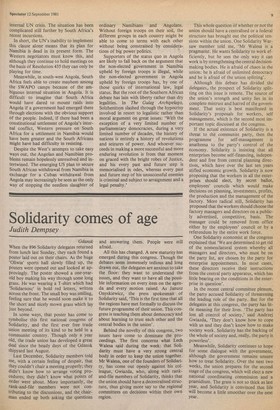Solidarity comes of age
Judith Dempsey
Gdansk When the 896 Solidarity delegates returned from lunch last Sunday, they each found a Poster laid out on their chairs. As the huge `Oliwia' sports hall slowly filled up, the Posters were opened out and looked at approvingly. The poster showed a one-yearold boy making his way through some long grass. He was wearing a T-shirt which had `Solidarnosc' in bold red letters, written across the front. The small boy was smiling, feeling sure that he would soon make it to the short and nicely mown grass which lay Just beyond.
In some ways, that poster has come to Symbolise this first national congress of Solidarity, and the first ever free trade union meeting of its kind to be held in a communist country. Though only a year old, the trade union has developed a great deal since the heady days of the Gdansk shipyard last August.
Last December, Solidarity members told me, with a certain feeling of despair, that they couldn't chair a meeting properly; they didn't know how to arrange voting procedures; they didn't know what points of Order were about. More importantly, the rank-and-file members were not contributing to the discussions, and the, chairman ended up both asking the questions and answering them. People were still afraid.
All this has changed. A new maturity has emerged during this congress. Though the debates seem immensely tedious and long drawn out, the delegates are anxious to take the floor: they want to understand the issues, and they want to have all the possible information on every item on the agenda and every motion raised. As Janusz Onyskiewicz, the press spokesman of Solidarity said, 'This is the first time that all the regions have met formally to discuss the future programme of their union. This congress is teaching them about democracy and about learning to trust each other and the central bodies in the union'.
Behind the novelty of this congress, two issues have come to dominate the proceedings. The first concerns what Lech Walesa said during the week: that Solidarity must have a very strong central body in order to keep the union together. Mr Walesa, one of the founders of Solidarity, has come out openly against his colleague, Gwiazda, who, along with rankand-file members of Solidarity, thinks that the union should have a decentralised structure, thus giving more say to the regional committees on decisions within their own region. This whole question of whether or not the union should have a centralised or a federal structure has brought out the political tensions within the union. One Solidarity Warsaw member told me, `Mr Walesa is a pragmatist. He wants Solidarity to work efficiently, but he sees the only way it can work is by strengthening the central decisionmaking bodies. He is afraid of chaos in the union: he is afraid of unlimited democracy and he is afraid of the union splitting'.
Although this debate has divided th delegates, the prospect of Solidarity splitting on this issue is remote. The source of the union's strength and unity lies in its complete mistrust and hatred of the government. That unity is best manifested in Solidarity's proposals for workers, self management, which is the second most important topic discussed at the congress.
If the actual existence of Solidarity is a threat to the communist party, then the programme for self-management is anathema to the party's control of the economy. Solidarity is insisting that all enterprises become self-financing, independent and free from central planning directives, which have over the last ten years stifled economic growth. Solidarity is now proposing that the workers in all the enterprises should elect, by secret ballot, employees' councils which would make decisions on planning, investments, profits, the production and the management of the factory. More radical still, Solidarity has proposed that the workers should choose the factory managers and directors on a publicly advertised, competitive, basis. The manager could be removed from office either by the employees' council or by a referendum by the entire work force.
One Solidarity economist at the congress explained that 'We are determined to get rid of the nomenclatural system whereby all managers and directors, who must be on the party list, are chosen by the party for enterprise appointments. In most cases, these directors receive their instructions from the central party apparatus, which has little bearing on the conditions in the enterprise in question'.
In the recent central committee plenum, the party accused Solidarity of threatening the leading role of the party. But for the delegates at this congress, the party has little meaning for their lives. 'The party has lost all control of society,' said Andrzej Gwiazda, 'They don't know how to cope with us and they don't know how to make society work. Solidarity has the backing of the whole of society and, really, the party is powerless'.
Meanwhile, Solidarity continues to hope for some dialogue with the government, although the government remains unsure how to treat Solidarity. Over the next two weeks, the union prepares for the second stage of the congress, which will elect a new national coordinating commission and a praesidium. The grass is not so thick as last year, and Solidarity is convinced that life will become a little smoother over the next year.
































 Previous page
Previous page